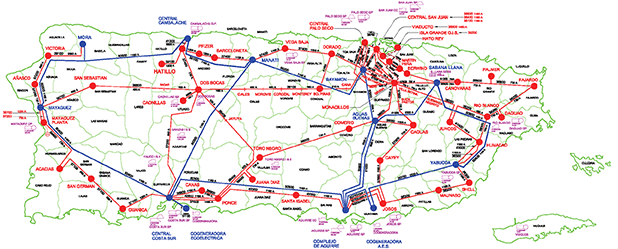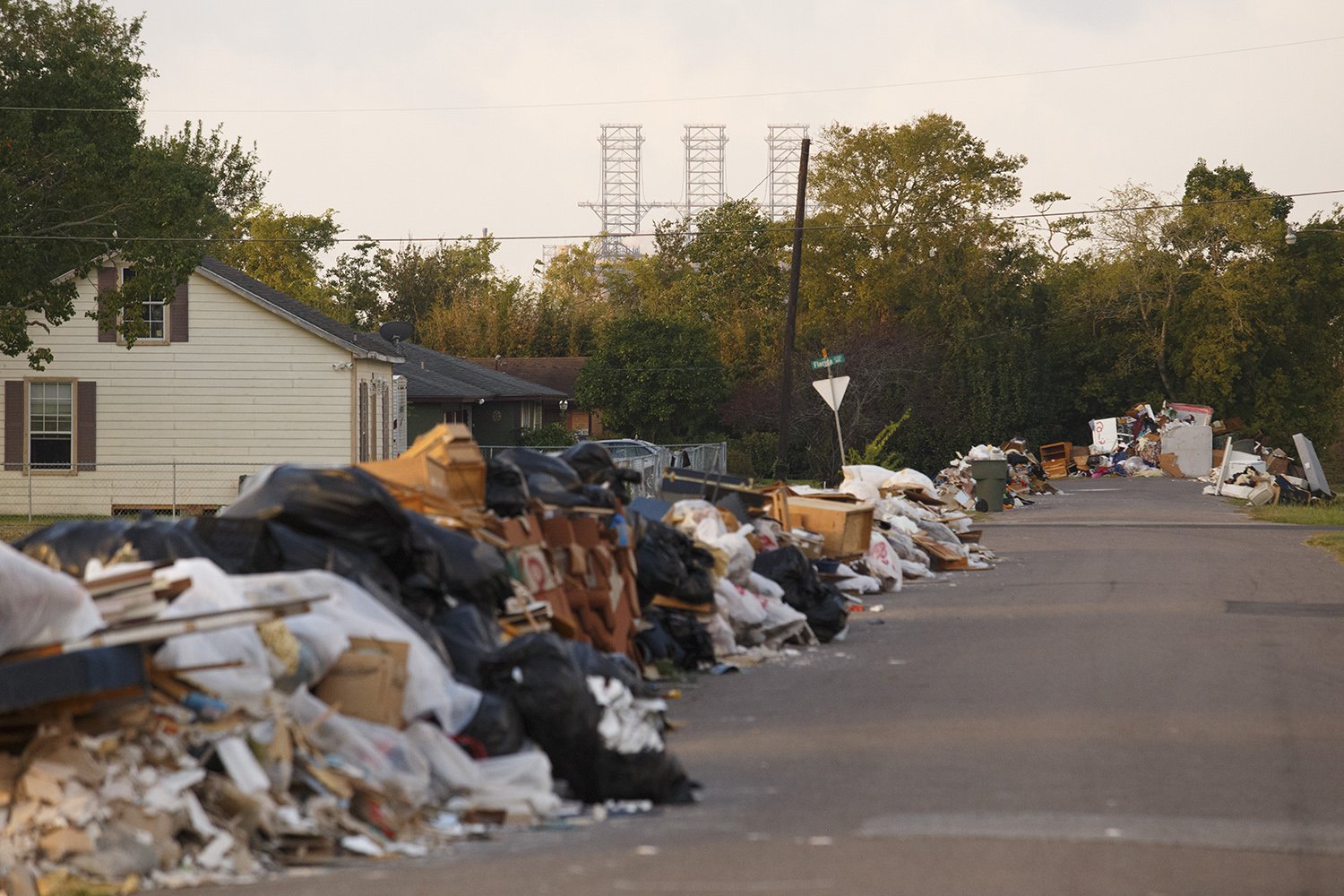“Civilization exists by geologic consent, subject to change without notice.” – Will Durant
“Recovery starts from the darkest moment.” – John Major
“Forget past mistakes. Forget failure. Forget about everything except what you’re going to do now – and do it.” (also) Will Durant
Start with Maria.

Puerto Rican recovery from Maria continues to break new ground – posing major challenges that had been unanticipated by planners (a direct, powerful hit of multiple islands, on the heels of multiple mainland disasters), and prompting unprecedented responses. The latest such response? Bringing the U.S. Army Corps of Engineers into the mix of efforts to restore Puerto Rico’s power grid (shown above). E&E News has a nice post on this, but their pieces are subscription-only, so here’s an excerpt or two (their news coverage is worth a look every day, even given today’s information glut):
…Lt. Gen. Todd Semonite, the Army Corps’ commanding general, has been “given a mission to restore power on Puerto Rico, writ large. Full stop,” Bossert said. The Army Corps’ immediate priorities remain assuring emergency electric power supplies to hospitals and other critical resources, and clearing roads to complete a damage assessment of the grid…
…The federal takeover of grid restoration departs from long-standing grid recovery operations where the utility industry played a central role in coordinating emergency efforts by line crews coming in from distant utilities. In Puerto Rico’s case, because the Puerto Rico Electric Power Authority (PREPA) is a public power company, that assignment fell to the American Public Power Association (APPA).
APPA President and CEO Sue Kelly said she was grateful for the Army Corps’ intervention. “Do we feel like we’re being pushed aside? Hell, no! It’s an all-hands-on-deck exercise, and we feel like they will be able to bring resources that will be extremely helpful,” Kelly said in an interview with E&E News.
In the industry response to Hurricane Harvey in Texas and Hurricane Irma in Florida, utility crews from distant states drove to the scene to join in restoration. That was impossible for Puerto Rico and the U.S. Virgin Islands, and APPA said it could not dispatch help in any case until it was sure line crews would be safe.
“The situation and the conditions are extremely adverse, and we don’t want to send people in until we know they can be housed, they can be fed, they have water, they have tools, they have trucks, they have fuel,” Kelly said…
… [Streit]”Some of the reasons that the Army Corps is getting involved is because we know the challenge that PREPA faces,” she said. “It’s one thing to be going through the financial troubles they have; it’s another to have two enormous hurricanes hit you head-on, and it’s additionally problematic when your people are the line workers.
…”The idea behind the Army Corps is to provide additional assistance and structure to get them back on their feet,” she [Streit] said.
(For historical reasons, dating back to our Nation’s founding, the use of the uniformed services in response to domestic emergencies has always been cautious, requiring much in the way of formal requests from states and territories. That minimizes the risks of military takeover seen elsewhere around the world. However, it also has resulted, as here in the Puerto Rican instance, serious delays in getting help to Americans where needed.)
Irma.

Puerto Rico’s humanitarian crisis captures today’s headlines, because life and death for millions still hang in the balance, and because the devastation is slightly more recent. But mainland remains in the very early stage of recovery, and would be in the national news were it not for Maria. But there is plenty of concern evident in the local headlines. Hotels and other tourist venues across the Florida Keys are struggling to reopen for visitors on October 1. Though three weeks ahead of schedule, this is as much a desperate effort to reboot the economy as a return to business-as-usual.
“We know we have a long way to go before the Keys fully recover,” Monroe County Mayor George Neugent said in a statement. “But because tourism is our top economic engine and many of our residents’ livelihoods depend on it, we also know that we need to begin asking visitors to return.”
October is an important month for their recreation industry, even as 25% of housing for residents has been destroyed. Low-cost housing was a particular casualty. Insurance claims continue to mount. National and state parks are facing a long, slow return to normal. Some resorts/golf courses escaped, but others were hard hit. Florida’s citrus crop (shown above) was devastated. And on and on.
Harvey.

In Texas the big story is the developing differences between the city of Houston and the state of Texas about whether the state should tap into its so-called rainy day fund to accelerate Houston’s recovery. A second story is also building. The state has appointed Texas A&M Chancellor John Sharp as a recovery czar. ABC News reports:
The man tasked with overseeing Texas’ Hurricane Harvey rebuilding efforts sees his job as “future-proofing” before the next disaster, but he isn’t empowered on his own to reshape flood-prone Houston or the state’s vulnerable coastline, which has been walloped by three major hurricanes since 2006.
Texas A&M Chancellor John Sharp will face the same political and bureaucratic challenges that have long stalled meaningful improvements in storm protections, and some doubt that even Harvey’s record flooding and huge price tag will bring about real change…
… Sharp, who was appointed by Republican Gov. Greg Abbott, follows a line of fix-it men charged with picking up the pieces following major storms in recent years, including Hurricane Katrina in 2005 and Superstorm Sandy in 2012. He has won early bipartisan praise as a practical choice to preside over the efforts to recover from Harvey, which killed more than 70 people and damaged or destroyed more than 200,000 homes.
Sharp is the rare Democrat with sustained relevance in Republican-controlled Texas. He is former lawmaker and state comptroller who was U.S. Energy Secretary Rick Perry’s college roommate at Texas A&M, which Sharp has led since 2011 and will continue to lead while overseeing the rebuilding effort. Abbott joked that he’s now getting calls, texts and emails from Sharp “up to and sometimes well after midnight.”
Sharp hasn’t laid out a long-term rebuilding plan yet and most of his public comments so far have been aimed at reassuring hard-hit communities that he won’t be a bureaucratic cog. But he has indicated that he’s thinking about the next disaster, saying “one of the guiding principles will be to future-proof what is being rebuilt so as to mitigate future risks as much as possible.”
Experience – not just from Houston, but from across the United States, suggests this “future-proofing” won’t be easy.
Meanwhile, our national news media have moved on – to coverage of NFL political football, proposed death of the “death tax,” and other tax code makeovers, charter-flight expenses of top political leaders, Russian tampering with the U.S. political process. Some if not all of this matters. News is, after all, “what is making today different from yesterday?” But behind the national headlines, for millions of Americans, the personal lead story day in and day out for months and in some cases years to come – perhaps even the defining moment in their life narrative – will be their experience with the 2017 hurricanes and their aftermath .
For them, “recovery,” won’t be quite the right word. For them, “recovery” as sometimes glibly tossed about by hazards academics and practitioners alike, as connoting a sense of completed action, has a whiff of “oxymoron.”
We all need to remain mindful of their continuing struggles and honor their continuing courage. As part of that mindfulness, we need to come alongside the Maria, Irma, and Harvey survivors, and remain there. We need to make shelter-in place, not evacuation, our goal, at both the community- and national levels – and refuse to settle for anything less.
With them, we all need to “Forget about everything except what [we’re] going to do now – and do it.”


If some of the issues cited were “not anticipated,” then those responsible should be taken out and shot. It was not creative or difficult to imagine that a major hurricane would be catastrophic for Puerto Rico.